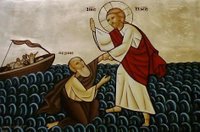I think this is really true. It made me think of learning new things, and how I can understand them as I learn them but then completely forget them. It isn't until I have to do something with that learning that I know whether or not understood it fully. For example, learning Hebrew. I understand the lectures as they are given, it makes sense. But then when I go home and try to do the homework I have to check the book over and over to figure it all out again. I've understood, but it hasn't become a part of my life, of who I am. I currently can't form a Niphal (a Hebrew verb form) participle and show its differences from a Niphal perfect, and until I can I haven't truly understood the Niphal paradigm.
It's the same with faith. I think nonviolent resolution to conflict is the best way. I talk about it a lot. I support groups that work on nonviolence. But how much do I actually DO to work for nonviolent resolution to conflicts?
 Luz also says of Matthew, "Faith is mingled in doubt....Faith is expressed in prayer. Prayer is a cry for God's help, at once encompassing trust and desperation. Faith, for Matthew, is not simply a permanent possession...." Here he is talking about Peter's attempt to walk on water with Jesus in Matthew 14. Peter has the courage to attempt this crazy thing, he steps out of the boat, he walks a few steps--and then he freaks out. Suddenly he realizes what he's doing, that this is crazy, that it's impossible to walk on water, and he starts to sink. But he cries out, "Save me, Lord!"
Luz also says of Matthew, "Faith is mingled in doubt....Faith is expressed in prayer. Prayer is a cry for God's help, at once encompassing trust and desperation. Faith, for Matthew, is not simply a permanent possession...." Here he is talking about Peter's attempt to walk on water with Jesus in Matthew 14. Peter has the courage to attempt this crazy thing, he steps out of the boat, he walks a few steps--and then he freaks out. Suddenly he realizes what he's doing, that this is crazy, that it's impossible to walk on water, and he starts to sink. But he cries out, "Save me, Lord!"I like this depiction of faith. It's kind of scary, because it's not the nice little neatly packaged "salvation" that sounds so easy--say a prayer and you're in--but instead it's a daily, moment-by-moment struggle to stay focused on God. There's no assurance that at any moment I might not start to sink. But there is assurance that I can cry out to God in my moments of doubt--and this is what faith is all about. It's about living out the things we're called to, even when they're scary and crazy, and being willing to admit our doubt and fear.
I want to be the kind of person who hears and understands--truly understands, by putting my faith into practice. I want to be the kind of person who responds with honest prayers of desperation and doubt. I want to listen well--which we as Quakers definitely try to do--and then go out and act, continuing to listen all the way.
1 comment:
I really like what Luz says about faith not being an intellectual understanding, but that a person has to act on that understanding. But what is it that I’m acting on? Is it only intellectual understanding? This makes me think of Parker Palmer and his definition of teaching, “Teaching is creating a space in which the community of truth can be practiced.” When Palmer teaches, he figures that truth isn’t something people in a teaching setting are seeking, but that truth is something (or someone) that is seeking/pursuing those people. He also thinks that everyone in that setting can receive (be in relationship with) truth and as they receive the truth they need to share it with the others in the community, so that Truth can be understood more fully. Think of a Meeting for Clearness or Meeting for Worship for Business in which everyone involved needs to share the truth they receive in order for the community to discern the greater truth.
So back to Luz. Sure, truth is something that needs to be understood and acted on, but Palmer might suggest that truth isn’t just something to be understood, but something with which we are in relationship. Jesus said, “I am the truth…” I don’t just understand Jesus, I’m in relationship with Jesus…with Truth. (See what I wrote from Richard Rohr under your “God imagining God's self to us” blog.) I can understand my wife, what’s true about her, and act accordingly. So I understand that touch is important to her, that being lovingly hugged brings her joy and life. But how will this understanding of truth become part of who I am so deeply that I don’t have to intellectually think about hugging my wife in order to bring her joy. Maybe when I enter into relationship with her and the reality of that relationship shapes me into the person that I am becoming. And maybe the transformation of my understanding of reality within the context of relationship causing me to act differently in the world is faith. Maybe. It sounds good anyway. Hmmm…think I’ll go hug my wife.
Your reference to the story of Peter walking on water is great. I see the waves. I start to sink. My understanding of reality (truth) is creating fear in me. Why? Maybe because I’ve moved from my heart…from relationship…back into understanding reality outside of that relationship. So I cry out. I return…like in centering prayer or unprogrammed worship…to relationship, so Jesus can shape my understanding of reality.
PJB
Post a Comment